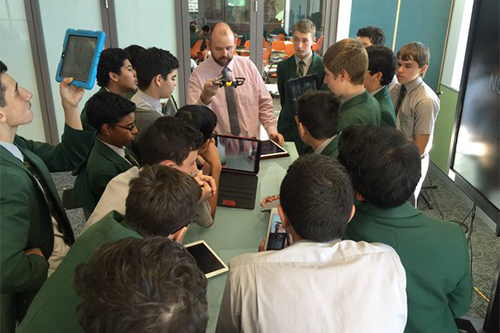
Catholic Education Diocese of Parramatta experts say that parents and teachers need to think differently about failure. Forget simply seeking a pass mark: failure and challenge can actually set students up for success.
At the recent 2021 National Boys’ Education Conference, Catholic Education Diocese of Parramatta Head of Contemporary Learning and Research Dr Gavin Hays and his colleague Dr Daniel Bateman from Parramatta Marist High won the ‘Best in Research and Scholarship Award’ for their presentation, “Failure Based Learning: the Flipped Classroom in Senior Years Improves Final Student Achievement”.
Reflecting on what students can learn from failure, Dr Hays speaks about the “cognitive wobble” some students experience in learning from misconceptions.
“High achievers may not have this experience often. It’s important for all students to struggle and be supported,” Dr Hays told The Educator.
Bateman and Hays share a commitment to challenge in learning forged through their work at Parramatta Marist High, an innovative school that regularly receives the highest HSC results of any Catholic systemic school in NSW. Their research demonstrates that the school’s academic performance saw improvement each time a new approach to learning was adopted across the school, with particularly strong results associated with the introduction of Flipped Learning.
For several decades, Parramatta Marist High has adopted a range of innovative learning approaches beginning with Project-Based Learning. The school later also took on Problem-Based Learning, and eventually Flipped Learning for senior students, staging the previous approaches through the junior years. Hays and Bateman believe that the learning journey through the school sets students up to make the most of an approach like flipped learning. “It’s not just the end point but what the boys had learnt the whole way through,” Dr Hays said.
As a key part of their learning, students are presented with a problem that may have more than one solution, and are challenged to present the best option. “Sometimes it's good to present students with a mess, then see what strategies they activate and then support them to solve it.”
Group problem-solving itself provides opportunities to learn from failure and challenge. Hays points to being part of dysfunctional groups from time-to-time as a great example of a chance to learn from failure. Parramatta Marist High Assistant Principal Adam Hendry, who also presented at the Conference, has captured alumni reflections on what they learnt from the innovative approaches at the school, this highlighted the chance to learn from group work gone wrong and how these experiences enabled them to be successful in their chosen field.
Combined with chances for meta-cognitive feedback, the research suggests that risk, challenge and failure are a recipe for success when it comes to learning.
Reflecting on the current COVID-19 lockdown in Sydney, Dr Hays points out that it’s important for students to learn that things don’t always go to plan. “Look at now,” Dr Hays says. “You’re going to have curveballs. It’s how we respond that makes the difference”.


